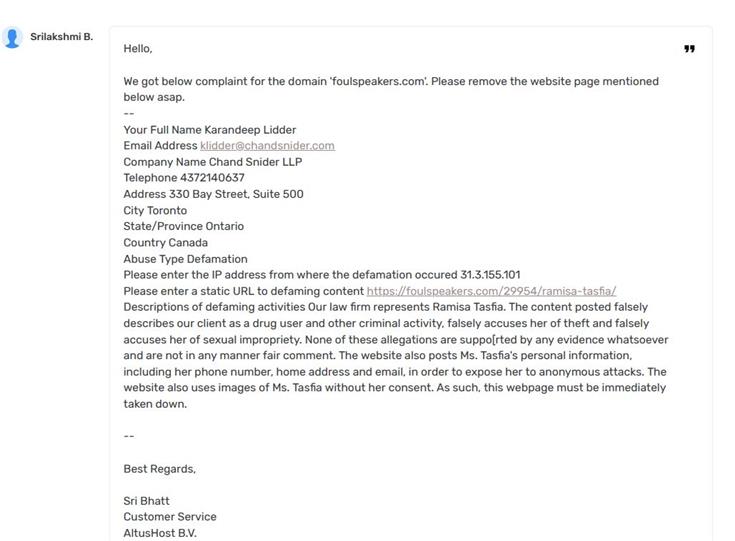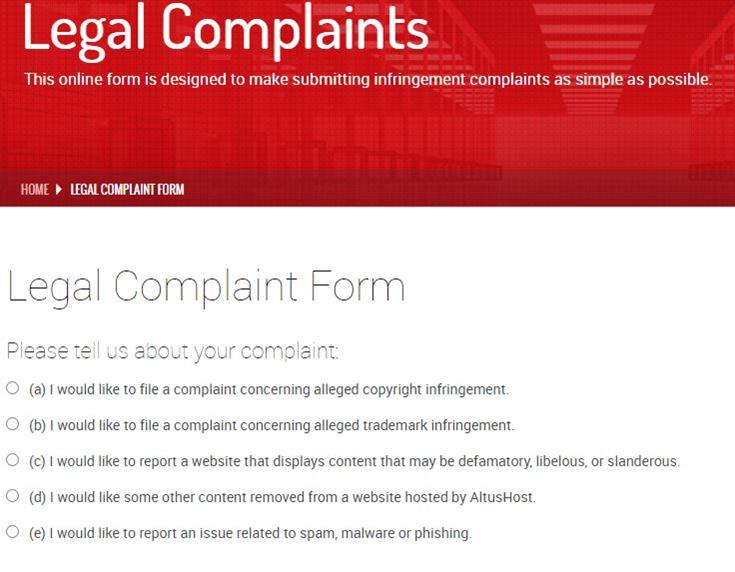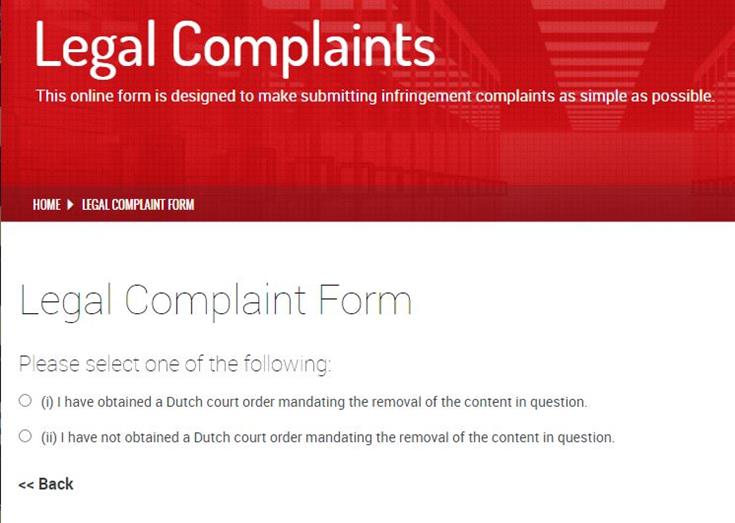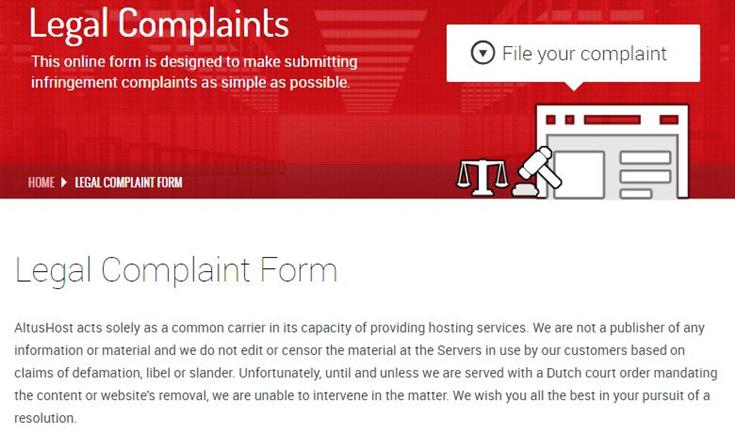
Altus Host B.V.
Altus Host B.V. states on their website that they will not censor websites hosted on their server without a Dutch court order, but do so anyway. We found this out the hard way after choosing to host a network of niche search engines on their servers. Everything went well for over a year until one day we received an email from Srilakshmi Bhatt at Altus Host saying that they received a complaint alleging that one page on one site contained defamatory statements according to a lawyer representing the subject of the statements. We get complaints alleging defamation all the time so we thought little of it at first until we noticed that Bhatt demanded that we remove the page from the site. We had never received a demand of that nature from an offshore hosting company before and though it was surely a mistake. After a lengthy back and forth it became obvious that Altus Host had no interest in honoring prior statements made on their website regarding such interventions and had no intention of protecting our free speech rights, so rather than allow them to censor us we moved to a different hosting provider.
The complaint that started all of this came from Karandeep Lidder at the law firm Chand Snider LLP in Toronto, Ontario. According to the Chand Snider website Mr. Lidder is a "student at law" working at that firm (https://www.chandsnider.com/bankruptcy-and-commercial-tenancies-landlords-rights.html) which offers a variety of legal services in civil and criminal law with the slogan "Lions at Your Side." Mr. Lidder never bothered to complain to our search engine directly and elected instead to submit a complaint directly to the hosting company. His complaint read as follows:
"Our law firm represents Ramisa Tasfia. The content posted falsely describes our client as a drug user and other criminal activity, falsely accuses her of theft and falsely accuses her of sexual impropriety. None of these allegations are supported by any evidence whatsoever and are not in any manner fair comment. The website also posts Ms. Tasfia's personal information, including her phone number, home address and email, in order to expose her to anonymous attacks. The website also uses images of Ms. Tasfia without her consent. As such, this webpage must be immediately taken down."
Upon review of the web page we learned that it was an article about an alleged police informant found on a now defunct website that was called Golden Snitches. The purpose of Golden Snitches was to provide users with a platform for exposing people that give information to law enforcement. That is an entirely legal practice (ex: https://copblaster.com/snitches/). At some point an anonymous user signed up for the site and posted an article describing Ms. Tasfia as a promiscuous drug user with STDs that snitches on people. We of course have no idea if these accusations are true or not. We do not know Ms. Tasfia or the author. We just run a niche search engine called Foul Speakers that aggregates and archives "Talk That Makes Your Skin Crawl" from a variety of online sources. Articles are allowed to remain on Foul Speakers so long as they accurately document statements made by someone who is arguably a foul speaker or describing a foul speaker. The article about Ms. Tasfia was obviously written by a foul speaker, so we decided that it was not qualified for removal. Our response to Sri Bhatt was as follows:
"FoulSpeakers is a search engine that like Google accurately documents content from around the internet. We are not in a position to judge the veracity of any content on the site and will not remove posts simply because someone disputes their accuracy. Please do not bother us with such complaints in the future as responding to them are not an efficient use of our time."
We thought that this explanation would be sufficient since as service providers themselves they understand that they are not legally responsible for the content of statements appearing on web pages hosted on their servers. We believed that they would realize that we did not make the statement, that the source website did not make the statement, and that the only person responsible for the content of the statement is some anonymous user of another website. That turned out not to be the case:
"We've received a complaint from the lawyer, a legitimate lawyer. We kindly ask you to read and act upon it... This attitude is kinda wrong. As a Hosting provider, we will forward every legitimate complaint to you and ask to act upon it. Your website and content on it is your responsibility. Ignorance and such attitude you presented will result in suspension or cancellation of services." - Anton V.
At first we figured that Anton was only referring to the standard host/client relationship when he said, "Your website and content on it is your responsibility." It is of course the position of web hosting companies that people using their services are ultimately responsible for what is there as far as they are concerned, but the only parties to that arrangement are the hosting company and the client. It does not cover whether or not the client is legally liable for the content. A website is liable for content if they created it themselves, but not if the content was created by a user on their site or any other. Under the law, specifically Section 230 of the Communications Decency Act (CDA) in the United States only the original author of the work is responsible for any allegedly defamatory statements. That is why we defend not removing posts based on complaints such as the one made by Mr. Lidder. As we explained to Anton:
"A lawyer is not a judge. Lawyers have no right to force you or I to remove anything. Your customers depend on you to protect their free speech rights. This Canadian lawyer isn't even in your jurisdiction. He is no threat to you or I, so we don't have to remove anything. There is a removal process, but neither this attorney or his client have participated in it. I cannot allow people like this lawyer to circumvent removal policies by writing letters to you. That would essentially make any page removable upon request."
That statement clearly explained why Altus Host had nothing to gain by censoring a paying customer. Realizing that they were being unreasonable we followed that response with a quick threat to move our business elsewhere if they continued in that manner. Then we went looking at their site to find language indicative of how most reasonable clients would expect them to respond in cases such as this one. Eventually we found a statement on their website stating that they will not intervene in cases involving defamation complaints unless they are served with a court order from a Dutch court:
"AltusHost acts solely as a common carrier in its capacity of providing hosting services. We are not a publisher of any information or material and we do not edit or censor the material at the Servers in use by our customers based on claims of defamation, libel or slander. Unfortunately, until and unless we are served with a Dutch court order mandating the content or website's removal, we are unable to intervene in the matter. We wish you all the best in your pursuit of a resolution." - https://www.altushost.com/legal-complaint-form-old/
We noted that the statement was in response to their old complaint form, but we are not aware of any policy changes since the new complaint form was added that would make us expect their response to be any different. Unfortunately, the new form does not have an automated response to defamation claims at all. It just collects enough information for them to identify the location of the material and the content of the complaint. Anton's response was evasive:
"I'm sorry, but we won't enter into further. discussion with you about what is right or wrong. Content on this page, properly reported by a lawyer, is accessible on the internet worldwide. As matter of fact, based on content on-page, it violates our AUP Policy - https://www.altushost.com/legal/general-acceptable-use-policy/ Point 1. We do understand that you are considering this as free of speech, however, it's really tin edge to be very opposite. Therefore, we'd kindly ask you to remove content within the next 96h, maximum by Monday 2/11/2020.
If you are not ok with this, we understand, however, we will have to cancel your services on the next due date 14/11/2020 and ask you to find another hosting provider."
We responded by pointing out that Anton failed to explain how it is possible for Altus Host to have a statement on their website saying that they would not do what he was doing and for him to be doing just that. Our response included:
"Your response does not address the simple fact that the stated position of Altus Host on claims of defamation is 'we do not edit or censor the material at the Servers in use by our customers based on claims of defamation, libel or slander. ' Your policy further states 'until and unless we are served with a
Dutch court order mandating the content or website's removal, we are unable to intervene in the matter.' By intervening in this matter you are violating your own policy regarding defamation complaints. This is not about right or wrong. It is about whether or not your company is making false statements on its website. False statements that lead potential clients to think that it is safe to host with you because you will not intervene without a Dutch court order."
We further explained that their own Acceptable Use Policy (AUP) does not prohibit us from making available content such as the page in question (https://www.altushost.com/legal/general-acceptable-use-policy/). Their police does say "Do not harass, threaten, or defame any person, group, or entity." But that policy does not cover documenting cases in which someone else used someone else's services to defame a person if the author of the content did in fact use the source site in that way. It certainly does not prohibit accurately reporting statements made by third parties elsewhere on the internet that is alleged but not proven to be defamatory. The only possible rule that the content may have violated was "Do not collect or disclose any personal address... without the data subject’s written consent." But that rule seems focused on data collected from end users and the dissemination of that data. It does not appear applicable to addresses posted online by third parties. Even if it did, Anton and Sri did not accuse the content of violating that rule. They said that it was defamatory. We further argued:
"Your AUP does not say anything about truthful representations of defamatory statements elsewhere on the web. The right to accurately report what others have said elsewhere on the internet goes to the heart of free speech. The substance of the statements being reported is irrelevant because the act of quoting such statements will always be an act of pure speech. You are treating me as if I made a defamatory statement in this case which is not true. I simply created a search engine that accurately documented a post made elsewhere on the internet. It is impossible for me to have defamed anyone by doing so because to sustain a claim of defamation you have to prove that someone intentionally made a defamatory
statement knowing it to be defamatory. A bot does not have a culpable state of mind necessary to make a defamatory statement."
That argument of course did not work since Anton had obviously made up his mind already and was not willing to admit that he was wrong. Our message concluded by saying:
"Since you guys cannot be trusted to honor your word I will be moving my business elsewhere. I already have a new server and in the coming days will be migrating my sites there. That is of course unless you are willing to acknowledge that your response in this case was not consistent with your stated policy in such matters and promise never to do it again."
As you can see we realized that we probably would not be able to stay with Altus Host before writing the message and were prepping the exchange for publication of this review. We wanted to make sure that we could say that everything was properly explained to Anton and that he had every opportunity necessary to make the correct choice. Anton's final reply was as follows:
"I'm afraid we won't agree on this one. As you clearly didn't read our policies in depth. And we are not going to repeat multiple times why content on the forwarded link is wrong on multiple levels. To avoid further problems for you and for us, it's best to proceed with the cancellation of services. Your service will be canceled on the next due date, 14/11/2020. Please find a new hosting provider and move your data before that date."
Today we responded to Anton by moving our services to a hosting company that promotes itself as a beacon for free speech. We hope that since our new host openly advertises itself as free speech friendly that they will not make the same mistake that Altus Host did.
False Advertising
We need not further explain why this constituted attempted censorship by Altus Host, but we feel the need to further backup our claim of false advertising. Altus Host does not advertise itself as offshore hosting, bullet proof hosting, refugee hosting, or using other language suggesting that they offer free speech friendly services beyond the automatic response to defamation claims submitted via their old legal complaint form. Some might argue that this is not false advertising since they did not make those claims in any promotional material. We consider it false advertising because any potential customer in need of enhanced free speech protection will do their homework. That homework includes looking into the policies of the company and how they respond to complaints. When we first looked at Altus Host we wondered if they would offer the same level of protection as other Dutch hosting providers we have used, so we poked around to figure out how they respond to complaints. When we read that they require a Dutch court order to remove content, we believed that they would not enforce their AUP on content related issues without a court order from a judge in their own country. That is important for anyone seeking to add an additional layer of protection between courts in their country and their web server. Had we not read that we would not have done business with them. Just because a false statement made by a company is not made in an advertisement does not mean that it is not a false statement made in connection with the sale of a good or service.
Not All Bad
Altus Host is not all bad. We would not have kept hosting with them for over a year if they were. They were decently priced with good uptime, speed, and customer support. We would recommend them for anyone in Europe not concerned about free speech liabilities. That is why we were so upset about leaving, but perhaps leaving is best for us. We were never able to get Microsoft to take our IP address off their Outlook/Hotmail block list, so we should get a fresh start there. Our new host is also a lot cheaper. We are using an unmanaged service now, but after learning to install cPanel ourselves we are confident that we can run our new server on our own good enough. Lastly, they gave us until the end of our last month to complete our exodus and for that we are grateful. They could have just shut us down and kept our data, but they didn't.
What Role Did the GDPR Play?
We are not sure what role (if any) the European Union's General Data Protection Regulation (GDPR) played. We posted a question about this on a web hosting forum and most of the feedback we received was that European hosting companies have to be stricter today than they were when we first began hosting in that part of the world. Some users cited the case of Google Spain v AEPD and Mario Costeja González (https://en.wikipedia.org/wiki/Google_Spain_v_AEPD_and_Mario_Costeja_Gonz%C3%A1lez) as proof that search engine websites are now required to remove some types of information about private citizens upon request if the content "appear[s] to be inadequate, irrelevant or no longer relevant or excessive in the light of the time that had elapsed." They call it the EU's "Right to Be Forgotten." The GDPR and that EU case didn't change much when it comes to original content, but it changes things for search engines dramatically. Dramatically enough that we will never host a search engine in the EU ever again. In fact, our new analysis concluded that the United States is a more free speech friendly place to host a search engine than the EU now due to the GDPR hammering them in the EU and Section 230 continuing to protect them in America. We think that the new response from Altus Host might have something to do with GDPR, but if it did they did not say so. Our last communication to them read:
"You really don't seem to explain how it is that your website states that you won't do what you are doing right now, and yet you are doing it anyway. What do you stand to gain by working with a Canadian lawyer over a paying customer? My best guess is that he must be paying you more than you would make if you were to continue hosting my sites for a long time. That or your company has assets in Canada that could be compromised if a you were to suffer an adverse ruling in a Canadian court. Other than that I don't see how your business benefits from what you are doing right now. If I am missing something please tell me what it is."
They did not respond to that message. The only threat we could see them facing from a Canadian lawyer would be the possibility of fines from the EU should the EU decide that they are violating the GDPR by not cooperating with him. We were hoping that they would reply with something to that effect if that were the case.
Conclusion
Do not host edgy content with Altus Host and do not host search engines in the EU. Altus Host is not a bad company, but we still feel that people considering them as an offshore provider could save some time and money by reading this.




Login to Comment and Rate
Already a PostAlmostAnything.com member?Login HereRegister to Comment and Rate
If you are not yet a PostAlmostAnything.com member Sign Up Here.